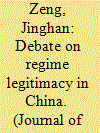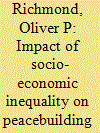| Srl | Item |
| 1 |
ID:
167070


|
|
|
|
|
| Summary/Abstract |
In recent decades, China has transformed from a relatively egalitarian society to a highly unequal one. What are the implications of high levels of inequality for the lives of children? Drawing on two nationally representative datasets, the China Family Panel Studies and the China Education Panel Survey, we develop a comprehensive portrait of childhood inequality in post-reform China. Analyses reveal stark disparities between children from different socio-economic backgrounds in family environments and in welfare outcomes, including physical health, psychosocial health and educational performance. We argue that childhood inequality in China is driven not only by the deprivations of poverty but also by the advantages of affluence, as high socio-economic status children diverge from their middle and low socio-economic status counterparts on various family environment and child welfare measures.
|
|
|
|
|
|
|
|
|
|
|
|
|
|
|
|
| 2 |
ID:
131639


|
|
|
|
|
| Publication |
2014.
|
| Summary/Abstract |
This article identifies continuities, new trends and shifts in emphasis in the Chinese elite debate about political legitimacy by analysing 125 Chinese articles concerning legitimacy published between 2008 and 2012. It reveals a remarkable cleavage between the international perceptions of the Chinese state and the pessimistic views among Chinese intellectuals about the party's ruling. It finds that Chinese scholars often look at Western theories when dealing with the legitimacy conundrum, and rarely look at Chinese philosophy. They focus on ideology much more than Western scholars, and they are more pessimistic about performance legitimacy than the latter. Moreover, this study finds that the legitimacy concerns and policy suggestions of scholars vary significantly depending upon their research locations, institutions and funding sources. This study also finds a distinct rising appeal of social autonomy that runs counter to the dominant official line. Nowadays, value changes, socioeconomic inequality and corruption are considered to be the most perceived threats to legitimacy; ideology, social justice and governance are the leading prescriptions for the party-state. This result is vastly different from the previous study, suggesting a fundamental shift in the legitimacy debate driven by the worsening socioeconomic problems in China.
|
|
|
|
|
|
|
|
|
|
|
|
|
|
|
|
| 3 |
ID:
141474


|
|
|
|
|
| Summary/Abstract |
Neoliberalism assumes that inequality creates productive competition and no risk of conflict where a viable state and social contract exists. From a critical position, inequality in a range of different forms (local to global in scale) weakens the links between civil society, solidarity, social justice, human rights and democracy. These positions have different implications for peace and order. State institutions are designed to make processes of consensual regulation permanent for the good of society. While continuing material inequality is inevitable, if the state and international community cannot mitigate its impact on security, rights and representation, in order to distribute a range of peace dividends, citizens rapidly begin to question the point of the state and undermine its legitimacy. Struggles over power, material resources and identity are thus untreated. This is especially problematic where the state also has been shaped through a peace agreement. Ironically, material inequality often lacking a Rawlsian justification of producing wider benefits of a peace dividend for society has been naturalised through peacebuilding and statebuilding, even though strong evidence suggests inequality is also at the root of many conflicts.
|
|
|
|
|
|
|
|
|
|
|
|
|
|
|
|